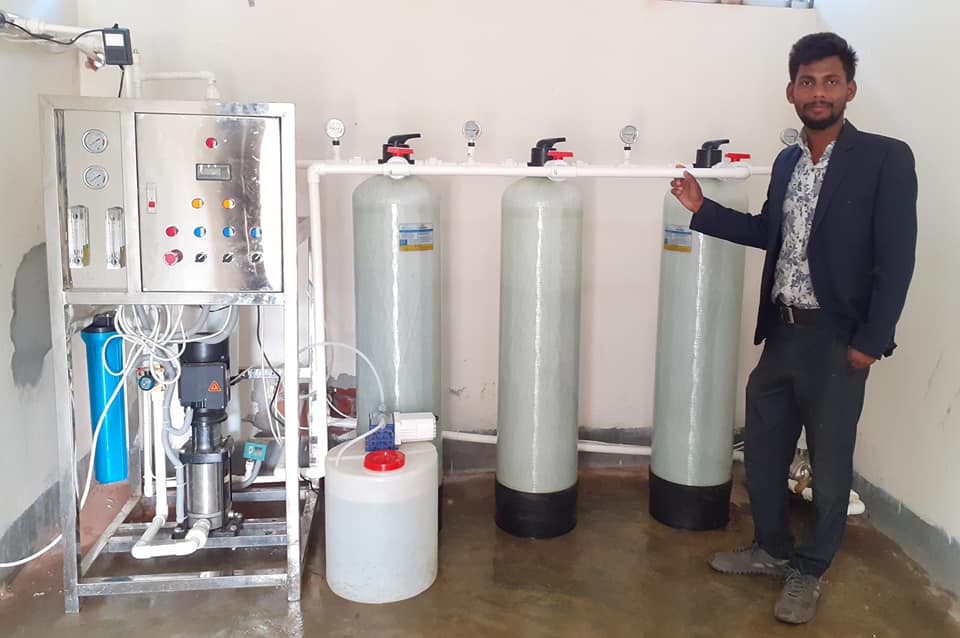Reverse Osmosis Plant
Reverse Osmosis Plant: Working process, key equipment, and updated price in Bangladesh — all in one quick guide.

What is reverse osmosis drinking water treatment plant?
A Reverse Osmosis Plant is the definitive choice for achieving superior water purification, essential for both industrial processes and potable water supply. Utilizing the principle of reverse osmosis, this cutting-edge technology separates contaminants from water by applying high pressure to force water through a semi-permeable membrane. This membrane acts as a molecular sieve, effectively rejecting up to 99% of Total Dissolved Solids (TDS), salts, bacteria, viruses, and heavy metals. Implementing a reliable Reverse Osmosis Plant is crucial for maintaining compliance with stringent water quality standards and protecting public health.
The core function of a Reverse Osmosis Plant begins post-pre-treatment, where a high-pressure pump forces feedwater past the semi-permeable membrane, overcoming its natural osmotic pressure. This critical hydraulic pressure drives the primary separation, allowing only pure water (permeate) to pass through the membrane’s microscopic pores. This action effectively rejects up to 99% of Total Dissolved Solids (TDS), including salts, heavy metals, and all microbiological contaminants.
The rejected impurities form a concentrated reject stream (brine) that is continuously flushed out, ensuring maximum membrane efficiency and longevity. The final stage involves post-treatment, where the permeate is directed through a post-carbon filter for aesthetic polishing and often subjected to UV sterilization as a final microbial safety barrier. Investing in a robust Reverse Osmosis Plant guarantees a reliable and efficient source of high-purity, potable water, setting the gold standard in modern water purification technology.

Why Reverse Osmosis Plant Is Important?
1. Health and Safety Assurance
- Harmful Pathogens: Bacteria and viruses that cause waterborne diseases
- Chemicals: Chlorine, fluoride (if removal is desired), and residual pharmaceuticals.
- Inorganic Toxins: Heavy metals like arsenic and lead, and nitrates, which pose severe health risks.
- Total Dissolved Solids (TDS): By drastically reducing TDS, it ensures the water is safe for consumption and has a neutral, clean taste and odor.
2. Industrial and Commercial Necessity
- Manufacturing: Provides ultra-pure water needed for pharmaceuticals, electronics, food and beverage production, where even trace impurities can compromise the final product.
- Preventing Scale and Corrosion: By removing dissolved minerals (like calcium and magnesium), the RO system prevents scaling in boilers, pipes, and machinery, significantly reducing maintenance costs and extending equipment lifespan.
- Water Scarcity Solutions: Reverse Osmosis Plants are vital for desalination, converting brackish water or seawater into a usable fresh water supply, which is critical in arid regions or areas facing water shortages
3. Water Recycling and Sustainability
-
Wastewater Reuse:RO technology is used to treat industrial and municipal wastewater, allowing it to be recycled and reused.This conserves natural water resources and helps industries comply with environmental discharge regulations by cleaning effluent to acceptable levels.
4. Desalination and Brackish Water Treatment
- Combatting Water Scarcity: In coastal regions or areas with limited freshwater sources, large-scale RO plants (like Seawater RO or SWRO plants) are vital for converting saltwater and brackish water into potable (drinkable) water. This is a major strategy for sustainable water management.
Reverse Osmosis Plant working process
1. Pre-treatment Stage 
- Filtration (Sediment & Multi-Media): Raw water first passes through filters (like quartz sand or multi-media filters) to remove large suspended solids such as dirt, sand, rust, and silt.
- Chemical Dosing (Antiscalant & Dechlorination): Antiscalant is added to prevent scaling (buildup of mineral deposits like calcium and magnesium) on the RO membranes.
- Precision Filtration: The water then goes through a finer filter, typically a cartridge filter to catch any remaining particles that could clog the membrane.
2. Reverse Osmosis (RO) Membrane Separation ⚙️
- Pressurization: A high-pressure pump is used to significantly increase the pressure of the pre-treated water. This applied pressure must be greater than the natural osmotic pressure of the water.
- Separation: This high pressure forces the water molecules through the semi-permeable RO membrane.
- Permeate (Purified Water): The pure water molecules pass through the membrane’s tiny pores.
- Concentrate/Brine (Waste Stream): Dissolved salts, heavy metals, viruses, bacteria, and other contaminants are too large to pass through the membrane and are left behind. This concentrated reject stream is continuously flushed away. The RO stage typically removes 95% to 99% of dissolved salts.
3. Post-treatment and Storage ✨
- Post-Filtration/Polishing: The water may pass through a final carbon filter (a “polishing” filter) to remove any residual tastes or odors, ensuring high-quality output.
- pH Adjustment/Remineralization: Since RO water is slightly acidic and very pure, minerals may be added back (remineralization) to improve taste and adjust the pH to a healthy alkaline level, or other chemicals may be added for corrosion control in the distribution system.
-
Disinfection: Further disinfection (like UV light or chlorination) may be applied before the water is sent to the storage tank for distribution.
Reverse Osmosis Plant Treatment Features
-
Ultra-High Purity
-
Microbial Safety
-
Heavy Metal Removal
-
Deionization
-
Cross-Flow Design
-
Energy Efficiency
-
Automated Control (PLC)
-
Pre-Treatment Protection
-
Final Conditioning

